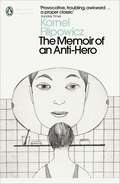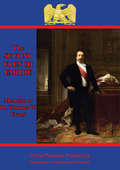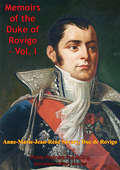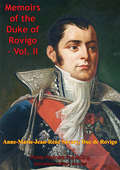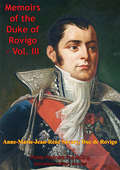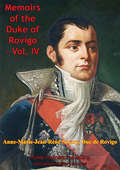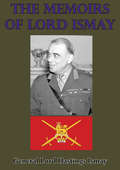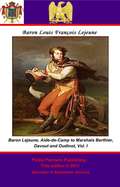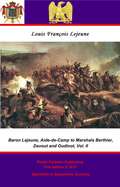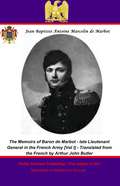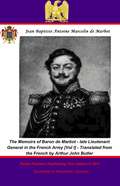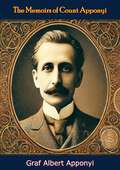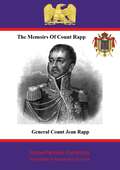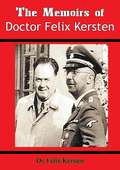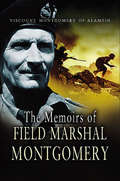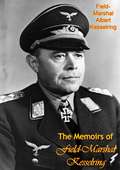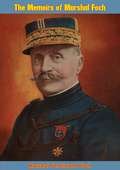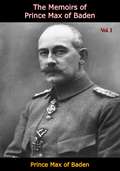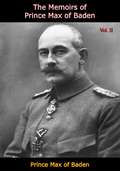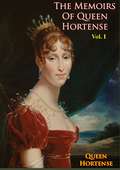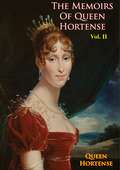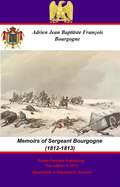- Table View
- List View
The Memoir of an Anti-Hero (Penguin Modern Classics)
by Kornel FilipowiczThe Second World War. Poland. Our narrator has no intention of being a hero. He plans to survive this war, whatever it takes.Meticulously he recounts his experiences: the slow unravelling of national events as well as uncomfortable personal encounters on the street, in the café, at the office, in his love affairs. He is intimate but reserved; conversational but careful; reflective but determined. As he becomes increasingly and chillingly alienated from other people, the reader is drawn into complicit acquiescence. We are forced to consider what it means to be heroic and how we ourselves would behave in the same circumstances.Written in 1961, this is the masterpiece of one of the great Polish writers of the twentieth century.
The Memoirs Of Dr. Thomas W. Evans: Recollections Of The Second French Empire
by Dr Thomas Wiltberger Evans Dr Edward A. CraneDespite not speaking a word of French, the intrepid Dr. Evans left his native Philadelphia for Paris. His professional qualifications as a dentist did not seem to indicate that his life be filled with the adventures that he gleefully threw himself into. Within a short period in Paris, he became renowned for his medical skill and enjoyed the confidences of Kings, Princes and no less a person than the Emperor Napoleon III. He acted as a go-between among the crowned heads of Europe with his engaging manner. As the American consul-general William Seward wrote: "IT SOMETIMES HAPPENS when the crowned heads of Europe wish to communicate with one another without any responsibility they send for Evans to fix their teeth. As you are not likely to send so far for a dentist, I need only add that the messages of this sort, which he bears, are always communicated to him by word of mouth and in the presence of no witnesses."His memoirs of the second Empire read both an engaging personal narrative and a secret view of the life of the court through tumultuous times including the diplomatic problems surrounding the Civil War, attempts at Coups d'état, numerous political plots, and disastrous Franco-Prussian war of 1870-71.
The Memoirs Of Duke Of Rovigo Vol. I (The Memoirs of Duke of Rovigo #1)
by Anne Jean Marie René Savary Duke of RovigoAs the tide of the French revolution swept away the noble privileges many of high birth fled the country, some officers stayed despite the danger of the revolutionaries, including both Napoleon and Anne-Jean-Marie-René Savary, loyal to the state and sniffing advancement. Savary enlisted as a volunteer and was posted to the Armies of the Sambre and Meuse rivers and then the Rhine, his distinguished services led him to selected as an aide-de-camp of General Desaix who was known as a shrewd judge of characters both of men and of soldiers. It was in the sands of the desert during the Egyptian Campaign in 1798 that Savary met Napoleon he would serve faithfully for the next 17 years in the almost unbroken conflict that scarred Europe. He served admirably with his old commander Desaix during the Italian Campaign in 1800, after Desaix fell at the battle of Marengo Napoleon decided to take Savary into his confidence and appointed him head of his bodyguard. Promoted to Général de Division in 1805 shortly before the Austerlitz campaign. Once again he displayed great gallantry and courage during the fighting, but Napoleon saw that his abilities were also of use away from the field, and started to use him as a diplomat upon who he could always rely. After further missions, particularly in intrigues in Spain, Savary was appointed Minister of Police in 1810, he discharged his duties with a zeal that would not have been out of place in the Spanish Inquisition but was at fault during the attempted coup d'état of General Malet in 1812 whilst the Grande Armée was struggling through the snows of Russia. He served on as a faithful servant of Napoleon until the bitter end after Waterloo in 1815, and was considered dangerous enough to be refused permission to go the Elba with his former master. The First Volume includes his early years in the army, Egypt, the Italian campaign, treasons of Moreau and Pichegru, the 1805 Austerlitz Campaign and the Jena campaign 1806.
The Memoirs Of Duke Of Rovigo Vol. II (The Memoirs of Duke of Rovigo #2)
by Anne Jean Marie René Savary Duke of RovigoAs the tide of the French revolution swept away the noble privileges many of high birth fled the country, some officers stayed despite the danger of the revolutionaries, including both Napoleon and Anne-Jean-Marie-René Savary, loyal to the state and sniffing advancement. Savary enlisted as a volunteer and was posted to the Armies of the Sambre and Meuse rivers and then the Rhine, his distinguished services led him to selected as an aide-de-camp of General Desaix who was known as a shrewd judge of characters both of men and of soldiers. It was in the sands of the desert during the Egyptian Campaign in 1798 that Savary met Napoleon he would serve faithfully for the next 17 years in the almost unbroken conflict that scarred Europe. He served admirably with his old commander Desaix during the Italian Campaign in 1800, after Desaix fell at the battle of Marengo Napoleon decided to take Savary into his confidence and appointed him head of his bodyguard. Promoted to Général de Division in 1805 shortly before the Austerlitz campaign. Once again he displayed great gallantry and courage during the fighting, but Napoleon saw that his abilities were also of use away from the field, and started to use him as a diplomat upon who he could always rely. After further missions, particularly in intrigues in Spain, Savary was appointed Minister of Police in 1810, he discharged his duties with a zeal that would not have been out of place in the Spanish Inquisition but was at fault during the attempted coup d'état of General Malet in 1812 whilst the Grande Armée was struggling through the snows of Russia. He served on as a faithful servant of Napoleon until the bitter end after Waterloo in 1815, and was considered dangerous enough to be refused permission to go the Elba with his former master. The Second Volume resumes with the 1807 campaign in Prussia, the invasion of Spain 1808, the 1809 campaign in Austria, the Peninsular War and his appointment to the Ministry of Police.
The Memoirs Of Duke Of Rovigo Vol. III (The Memoirs of Duke of Rovigo #3)
by Anne Jean Marie René Savary Duke of RovigoAs the tide of the French revolution swept away the noble privileges many of high birth fled the country, some officers stayed despite the danger of the revolutionaries, including both Napoleon and Anne-Jean-Marie-René Savary, loyal to the state and sniffing advancement. Savary enlisted as a volunteer and was posted to the Armies of the Sambre and Meuse rivers and then the Rhine, his distinguished services led him to selected as an aide-de-camp of General Desaix who was known as a shrewd judge of characters both of men and of soldiers. It was in the sands of the desert during the Egyptian Campaign in 1798 that Savary met Napoleon he would serve faithfully for the next 17 years in the almost unbroken conflict that scarred Europe. He served admirably with his old commander Desaix during the Italian Campaign in 1800, after Desaix fell at the battle of Marengo Napoleon decided to take Savary into his confidence and appointed him head of his bodyguard. Promoted to Général de Division in 1805 shortly before the Austerlitz campaign. Once again he displayed great gallantry and courage during the fighting, but Napoleon saw that his abilities were also of use away from the field, and started to use him as a diplomat upon who he could always rely. After further missions, particularly in intrigues in Spain, Savary was appointed Minister of Police in 1810, he discharged his duties with a zeal that would not have been out of place in the Spanish Inquisition but was at fault during the attempted coup d'état of General Malet in 1812 whilst the Grande Armée was struggling through the snows of Russia. He served on as a faithful servant of Napoleon until the bitter end after Waterloo in 1815, and was considered dangerous enough to be refused permission to go the Elba with his former master.The Third Volume continues with his service in the Ministry of Police, the continuing Peninsular War, the coup d'état of General Malet and the retreat of the French Army in 1813-1814.
The Memoirs Of Duke Of Rovigo Vol. IV (The Memoirs of Duke of Rovigo #4)
by Anne Jean Marie René Savary Duke of RovigoAs the tide of the French revolution swept away the noble privileges many of high birth fled the country, some officers stayed despite the danger of the revolutionaries, including both Napoleon and Anne-Jean-Marie-René Savary, loyal to the state and sniffing advancement. Savary enlisted as a volunteer and was posted to the Armies of the Sambre and Meuse rivers and then the Rhine, his distinguished services led him to selected as an aide-de-camp of General Desaix who was known as a shrewd judge of characters both of men and of soldiers. It was in the sands of the desert during the Egyptian Campaign in 1798 that Savary met Napoleon he would serve faithfully for the next 17 years in the almost unbroken conflict that scarred Europe. He served admirably with his old commander Desaix during the Italian Campaign in 1800, after Desaix fell at the battle of Marengo Napoleon decided to take Savary into his confidence and appointed him head of his bodyguard. Promoted to Général de Division in 1805 shortly before the Austerlitz campaign. Once again he displayed great gallantry and courage during the fighting, but Napoleon saw that his abilities were also of use away from the field, and started to use him as a diplomat upon who he could always rely. After further missions, particularly in intrigues in Spain, Savary was appointed Minister of Police in 1810, he discharged his duties with a zeal that would not have been out of place in the Spanish Inquisition but was at fault during the attempted coup d'état of General Malet in 1812 whilst the Grande Armée was struggling through the snows of Russia. He served on as a faithful servant of Napoleon until the bitter end after Waterloo in 1815, and was considered dangerous enough to be refused permission to go the Elba with his former master.The Fourth and concluding volume covers the fall of Paris in 1814 and Napoleon's first abdication, the Hundred Days campaign and Napoleon's final fall from power in 1815.
The Memoirs Of Lord Ismay
by General Lord Hastings Ismay KG GCB CH DSO PC“This memoir is a masterly narrative by a participant at the very centre of British decision-making during the entire Second World War. Major General ‘Pug’ Ismay was appointed secretary of the Committee of Imperial Defence in July 1938 and from there became, in May 1940, Churchill’s senior military assistant and an additional member of the Chiefs of Staff Committee. Officially, his role was the leadership of the office of the minister of defence. Churchill was by then both prime minister and minister of defence and continued in these twin roles throughout the war. Ismay saw himself as Churchill’s ‘agent’ and was once flippantly described as his ‘Eminence Khaki’. Ismay was in a unique position to observe Churchill, who became a close confidante.Ismay has been praised by several highly-placed sources for his achievements in diplomacy and man-management during his Army service. His tact and charm kept the potential friction between the chiefs-of-staff and their political masters entirely controlled. His ability to ride the sometimes wild swings in Churchill’s temperament, yet still bring to committees the correct interpretation and thrust of Churchill’s views, was highly valued.This book is a masterpiece of prose. It is a remarkable product of its time and is in no way self-indulgent. It lacks military jargon and acronyms. It is full of interesting and humorous anecdotes and provides an excellent account of many aspects of Churchill’s non-public persona. It contains a single monotone plate of the author as well as three organisational diagrams and four maps. Not only military historians, but anyone with an interest in British history from the 1920s to the 1950s, would be greatly satisfied with it.”—Bruce Short RUSI Journal
The Memoirs of Baron Lejeune, Aide-de-Camp to Marshals Berthier, Davout and Oudinot. Vol. I (The Memoirs of Baron Lejeune, Aide-de-Camp to Marshals Berthier, Davout and Oudinot. #1)
by Pickle Partners Publishing Mrs Arthur Bell Général de Brigade, Baron Louis-François Lejeune Major-General Sir John Frederick MauriceThis ebook is purpose built and is proof-read and re-type set from the original to provide an outstanding experience of reflowing text for an ebook reader. Amongst the many memoirs of the Napoleonic period, there are a number that stand out not just for their historical value, but also for their actual written style; however, in this sense Lejeune stands alone. He was by nature an artist and is still famous as a noted painter of scenes of battles, most of which he witnessed. As such his scenes are like his paintings, filled with evocative detail. The narrative in Vol. I runs from his earliest recollections of a chance encounter with Marie Antoinette to his joining the republican movement and a battalion of national volunteers. As the consulate dawns, we find him as an aide-de-camp with the army of reserve in 1800 and fought at the battle of Marengo. He was present at the battles of Austerlitz, Jena, Eylau, Friedland, Landshut, Eckmühl, Aspern-Essling and Wagram. A substantial part of this volume revolves around the vicious and protracted second siege of Saragossa, which even in the Peninsular War stands out for the courage and fierceness of both sides. His treatment of the siege and the forces engaged is the best of its genre by some distance. Lejeune was witness to some of the great events of the Napoleonic period, and moved with the grace of a courtier through them, his eye catches the human actors in his pen portraits beautifully. Highly Recommended. Includes Linked TOC Text taken from book published by Longmans, Green and Co, London 1897 Author: Général de Brigade Baron Louis Franc ois Lejeune, (1775-1848;) Translator: Mrs Arthur Bell [D'Anvers, N.],( ????-1933 ) Foreword: Major-General Maurice, John Frederick, Sir, 1841-1912 Annotations - Pickle Partners Publishing
The Memoirs of Baron Lejeune, Aide-de-Camp to Marshals Berthier, Davout and Oudinot. Vol. II (The Memoirs of Baron Lejeune, Aide-de-Camp to Marshals Berthier, Davout and Oudinot. #2)
by Pickle Partners Publishing Mrs Arthur Bell Général de Brigade, Baron Louis-François LejeuneThis ebook is purpose built and is proof-read and re-type set from the original to provide an outstanding experience of reflowing text for an ebook reader. Amongst the many memoirs of the Napoleonic period, there are a number that stand out not just for their historical value, but also for their actual written style, however in this sense Lejeune stands alone. Lejeune was by nature an artist and is still a famous as a noted painter of scenes of battles, most of which he witnessed. As such his scenes are like his painting filled with evocative detail. The narrative in Vol. II runs from the Napoleon's divorce of the Empress Josephine and his subsequent marriage to Marie-Louise of Austria with the attendant balls and festivities. As the war in Spain drags on, he is sent on an important mission to collect information for the Emperor, during which he is ambushed and captured by partisans. His subsequent imprisonment and transfer to Britain are painted in vivid colours and are surpassed only by his subsequent escape to France and evasion of the dread smuggler "Brick". Lejeune was on the staff of Marshal Berthier and, thereafter Marshal Davout, during the Russian campaign of 1812, and was witness to the bloody struggle to Moscow and the disastrous retreat back to Prussia. His numerous vignettes of the retreat are often quoted due to their detail and incisive nature, his description of his purchase of a bearskin from its unwilling seller, a colonel swaddled in furs, on the retreat is priceless. Lejeune also served on in the twilight of the Empire, at the battles of Lützen, Bautzen, and Leipzig. His military career was ended by wounds from a shell fragment the day after the battle of Hanau in 1813. Lejeune was witness to some of the great events of the Napoleonic period, and moved with the grace of a courtier through them, his eye catches the human actors in his pen portraits beautifully. Highly Recommended. Includes Linked TOC Text taken from book published in 1897, Longmans, Green and Co, London Author: Général de Brigade Baron Louis Franc ois Lejeune, (1775-1848;) Translator: Mrs Arthur Bell [D'Anvers, N.], ????-1933 Foreword: Major-General Maurice, John Frederick, Sir, 1841-1912 Annotations - Pickle Partners Publishing
The Memoirs of Baron de Marbot - late Lieutenant General in the French Army. Vol. I (The Memoirs of Baron de Marbot - late Lieutenant General in the French Army #1)
by Arthur John Butler Pickle Partners Publishing Général de Division, Baron Jean Baptiste Antoine Marcelin de MarbotThis ebook is purpose built and is proof-read and re-type set from the original to provide an outstanding experience of reflowing text for an ebook reader. Perhaps the most famous of all Napoleonic memoirs to be written in any language are those written by Marbot. They stand in a league of their own. Napoleon, himself left a donation of 100,000 to him, for his refutation of General Rogniat's work - to quote Napoleon's will "I recommend him to continue to write in defense of the glory of the French armies, and to confound their calumniators and apostates." So entertaining and full of vivid details that Sir Arthur Conan Doyle fictionalized them into his adventures of Brigadier Gerard. In this the first volume of his translated memoirs, it covers his early childhood, born into a military family, to his first steps on the military ladder as a hussar in the 1e Regiment de Hussards (ex-Bercheny). His dash and leadership lead to a commission and appointments on the staff of Generals Augereau and Masséna. He writes poignantly of his fathers death at the siege of Genoa (1800) and the privations suffered in the city by the defenders and the inhabitants alike. His career takes him to the battles of Austerlitz, Friedland, Eylau and Aspern-Essling. His narrative is full of anecdotes and vignettes of the great and the good of the Consulate and Empire, he portrays himself in the midst of such luminaries as the Emperor, his Marshals and Generals. Contains portrait of de Marbot from 1812 as a colonel of 23e Hussards, and maps illustrating the 1805, 1806 and 1809 battles. The text and maps are taken from the 1892 publishing by Longmans, Green and Co, London and New York. Author - Jean Baptiste Antoine Marcelin, Baron de Marbot, 1782-1854 Translator - Arthur John Butler 1844-1910
The Memoirs of Baron de Marbot - late Lieutenant General in the French Army. Vol. II (The Memoirs of Baron de Marbot - late Lieutenant General in the French Army #2)
by Arthur John Butler Pickle Partners Publishing Général de Division, Baron Jean Baptiste Antoine Marcelin de MarbotThis ebook is purpose built and is proof-read and re-type set from the original to provide an outstanding experience of reflowing text for an ebook reader. Perhaps the most famous of all Napoleonic memoirs to be written in any language are those written by Marbot. They stand in a league of their own. Napoleon, himself left a donation of 100,000 to him, for his refutation of General Rogniat's work - to quote Napoleon's will "I recommend him to continue to write in defense of the glory of the French armies, and to confound their calumniators and apostates." So entertaining and full of vivid details that Sir Arthur Conan Doyle fictionalized them into his adventures of Brigadier Gerard. In this second volume, de Marbot continues his varied adventures under Napoleon's eagles, He writes of the battle of Wagram and the death of General Lasalle the finest light cavalry commander of the time. He is assigned to Masséna's campaign to conquer Portugal in 1810 and faces his opponents at Busaco and records the features of the impregnable Line of Torres Vedras. More interesting than the mere descriptions of the battles, combats and affairs he is involved in, are the intrigues and fall-outs at the Headquarters between Marshal Masséna and most of his divisional generals including the famous Marshal Ney, sometimes over his military handling of the campaign and at others over his bringing his mistress Miss---X. with him. He provides a somewhat skewed but vivid account of the battle of Fuentes d'Oñoro in 1811 and withholds no venom in his descriptions of Masséna in particular, and also the other bickering generals, controlling their fiefdoms in the Peninsular. He joins the 23rd Chasseurs-à-Cheval for the campaign in Russia. His unit is part of the flank guard for the Grande Armée's push to Moscow and provides details of the battle go Polotsk. He gives an incisive portrait of Marshal Gouvion Saint-Cyr, who he portrays as brilliant but cold and eccentric. Present at the crossing of the Beresina, he recounts the woes of the army he finds in pieces after the retreat from Moscow, beaming with pride at the state of his regiment. He moves rather briskly into the wars of German liberation and the epoch defining battle of Leipzig in 1813. He describes the action as best as any eye-witness can of three days of rolling battle and carnage can be. Bitterly and with some passion, he speaks of Napoleon's German allies turning on the French. He is rather fulsome in his criticism of his senior commanders especially Exelmans. The campaign of 1814 in defence of France is but briefly covered, and the 1815 campaign not at all. Contains portrait of de Marbot from 1812 as a lieutenant-general, and maps illustrating the battle of Leipzig. Additional notes have been added to this edition. The text and maps are taken from the 1892 publishing by Longmans, Green and Co, London and New York. Author - Jean Baptiste Antoine Marcelin, Baron de Marbot, 1782-1854 Translator - Arthur John Butler 1844-1910
The Memoirs of Count Apponyi
by Graf Albert ApponyiThe Memoirs of Count Apponyi by Graf Albert Apponyi is a captivating and deeply personal account of the life and times of one of Hungary’s most distinguished statesmen. Spanning a remarkable career in public service, these memoirs offer a rare and intimate glimpse into the political, social, and cultural transformations that shaped Central Europe from the late 19th century through the early 20th century.Count Apponyi, a key figure in Hungarian politics, was a prominent advocate for Hungarian independence and a passionate defender of his nation's rights within the Austro-Hungarian Empire. In his memoirs, he reflects on his role in some of the most pivotal events of his era, including the negotiations surrounding the Austro-Hungarian Compromise, the struggles for national sovereignty, and the complex dynamics of European diplomacy.Apponyi's memoirs are rich with personal anecdotes, detailed recollections of political debates, and portraits of influential figures he encountered throughout his career, including emperors, kings, and statesmen. His narrative is not only a chronicle of his own life but also a broader commentary on the challenges and triumphs faced by Hungary and Europe during a period of intense change and upheaval.The Memoirs of Count Apponyi also delve into the cultural and intellectual life of Hungary, showcasing Apponyi’s deep commitment to education, language rights, and the preservation of Hungarian heritage. His reflections on the Treaty of Trianon and its devastating impact on Hungary reveal the profound emotional and political consequences of the post-World War I settlement.This book is essential reading for historians, political scholars, and anyone interested in the history of Hungary and Central Europe. Count Apponyi’s memoirs provide an invaluable perspective on the forces that shaped the modern Hungarian state, offering insights into the complexities of nationalism, diplomacy, and leadership.The Memoirs of Count Apponyi stand as a testament to the life and legacy of a statesman who dedicated himself to the service of his country and the pursuit of justice and national identity.
The Memoirs of Count Rapp: First Aide-de-Camp To Napoleon
by Anon Pickle Partners Publishing Général de Division, Comte Jean RappThis ebook is purpose built and is proof-read and re-type set from the original to provide an outstanding experience of reflowing text for an ebook reader. The much wounded Count Rapp recounts his services under the Emperor Napoleon across Europe and into the depths of Russia. His frequent battlefield exploits, including a decisive charge with the Imperial Guard cavalry at Austerlitz, are balanced by polished descriptions of the court of the First Empire. Rapp's rise is charted from obscurity in the armies of the Republic to catching the attention of General Desaix whilst fighting on the Rhine, and thereafter General Bonaparte in Egypt and Italy, to the pinnacle of rank as the Emperor's first aide-de-camp, Général de Division, and Count of the Empire. Author - Général de Division, Comte Jean Rapp (1771 - 1821) Translator - Anon Includes Linked TOC Annotations - Pickle Partners Publishing
The Memoirs of Doctor Felix Kersten
by Dr Ernst Morwitz Konrad Maiden Dr Felix KerstenThis book, first published in English translation in 1947, is the fascinating autobiography of Dr. Felix Kersten, a Russian-born Finnish osteopath who tended to Heinrich Himmler in Germany during World War II and who contended he had obtained some amelioration of treatment of Jews and others.
The Memoirs of Field Marshal Montgomery: Of Alamein, K. G. (Memoirs Of Field Marshal Montgomery Ser. #1)
by Viscount Montgomery of AlameinIn his own words, the victor of El Alamein tells his life story in a book that&’s &“an absolutejoy to read and may be described as a tour-de-force&” (Belfast News Letter). First published in 1958 Montgomery&’s memoirs cover the full span of his career first as a regimental officer in the Royal Warwickshire Regiment and then as a Staff Officer. His choice of the Warwickshires was due to his lack of money. He saw service in India before impressing with his courage, tactical skill and staff ability in the Great War. Despite his tactless uncompromising manner his career flourished between the wars but it was during the retreat to Dunkirk that his true brilliance as a commander revealed itself. The rest is history, but in this autobiography we can hear Monty telling his side of the story of the great North African Campaign followed by the even more momentous battles against the enemy &“and, sadly, the Allies&” as he strove for victory in North West Europe. His interpretation of the great campaign is of huge importance and reveals the deep differences that existed between him and Eisenhower and other leading figures. His career ended in disappointment and frustration being temperamentally unsuited to Whitehall and the political machinations of NATO.
The Memoirs of Field-Marshal Kesselring
by Lynton Alfred Hudson Field-Marshal Albert KesselringOne of the only published memoirs of a WWII General Field-Marshall, these are the comprehensive memoirs of one of Germany's most prominent German air and field commanders and military strategists.Kesselring describes in detail the military training, his service in World War I, his work in the Reichswehr, his role in the founding of the Luftwaffe, and all aspects of his command in World War II.Concluding with Kesselring's account of his trial and imprisonment for war crimes, these memoirs give a full picture of the whole military experience of one of Germany's great commanders.
The Memoirs of Marshal Foch
by Marshal Ferdinand FochThe Commander-in-Chief of the Allied armies, the great strategist who directed the final victory, declined to publish his memoirs during his lifetime. Upon his death, his family at first intended to withhold his manuscript for ten or fifteen years, but the advice of the Marshal’s friends prevailed.So this, the final word on the winning of the great war, was released in 1931, just two years after Marshal Foch’s death.At first the Marshal planned to write a complete history, but he had neither the time nor the strength to complete so large a work. And it is fortunate for posterity that he did not. Others can collect and collate official documents. We have here what Foch alone could have written, his personal story of the war based solely upon his own experience.And it becomes apparent that Foch was not only the great commander and the leading strategist of his time but a writer with a sense of style and a graphic use of words that make his record one of the most moving and dramatic accounts of the great war.On certain details Foch’s views may be questioned, but his story of the victory may well be called the final word. Only the leader of ten million men can speak from the vantage of supreme command.Special maps prepared by the French War Office, unpublished photographs, and facsimiles of the Armistice are included.
The Memoirs of Prince Max of Baden Vol. I (The Memoirs of Prince Max of Baden #1)
by Prince Max of Baden Baden W. M. CalderThis is Volume I of II comprising the authorized translation of Prince Max of Baden’s German memoirs published in 1927 (original German title: Erinnerungen und Dokumente). This translation was first published in 1928.“NOT long after the Revolution, when it became clear that an essential share of the blame for the German collapse would be ascribed to me, I decided to give a public account of my stewardship. I soon realized that I could only explain the actual connection of events both to the German people and to myself if I submitted the charges made against me to a careful examination, and also made up my mind to understand the point of view of my opponents.“As early as 1919 I found myself compelled to define my attitude to the disputed happenings of 9th November. I did this in a publication which was printed in all the newspapers but was virtually hushed up in the controversial literature.“In the study and self questioning of eight years I think I have got as near the truth as I can.“In the course of my work my apologia has grown into something different—an account based on original sources of that fateful epoch of the history of Germany in which I was involved. I put my trust in the weight of the facts.” (Prince Max of Baden)
The Memoirs of Prince Max of Baden Vol. II (The Memoirs of Prince Max of Baden #2)
by Prince Max of Baden Baden W. M. CalderThis is Volume II of II comprising the authorized translation of Prince Max of Baden’s German memoirs published in 1927 (original German title: Erinnerungen und Dokumente). This translation was first published in 1928.“NOT long after the Revolution, when it became clear that an essential share of the blame for the German collapse would be ascribed to me, I decided to give a public account of my stewardship. I soon realized that I could only explain the actual connection of events both to the German people and to myself if I submitted the charges made against me to a careful examination, and also made up my mind to understand the point of view of my opponents.“As early as 1919 I found myself compelled to define my attitude to the disputed happenings of 9th November. I did this in a publication which was printed in all the newspapers but was virtually hushed up in the controversial literature.“In the study and self questioning of eight years I think I have got as near the truth as I can.“In the course of my work my apologia has grown into something different—an account based on original sources of that fateful epoch of the history of Germany in which I was involved. I put my trust in the weight of the facts.” (Prince Max of Baden)
The Memoirs of Queen Hortense Vol. I (The Memoirs of Queen Hortense #1)
by Jean Hanoteau Arthur Kingsland Griggs Queen Hortense Eugénie Cécile BonaparteIn presenting to the public the Memoirs of Queen Hortense exactly as she recorded them, in exposing it to scholars--with an intrinsic and absolute respect for the integral historical accuracy of the text--these intimate revelations as set down by her royal hand, Prince Napoleon did a service not only to history but also to the memory of a princess too often harshly criticized eminently French in her heart and mind, to the memory of an unfortunate Queen, to the memory of an exquisite woman.Like the Emperor, one of whose shadows she was and whose touching and affectionate farewell smile she received as he was leaving France for the last time, the Queen of Holland has nothing to lose by having all her acts and even her mistakes fully revealed.This becomes very clear as one peruses these volumes where she took care not to avoid any of the difficulties of her task. She knew what society said about her; she was aware of the reproaches, justified and unjustified, of which she was the object. Frequently, reading between the lines one is conscious of the care her pen took to refute certain implications, sometimes with disdain but never without courage.
The Memoirs of Queen Hortense Vol. II (The Memoirs of Queen Hortense #2)
by Jean Hanoteau Arthur Kingsland Griggs Queen HortenseIn presenting to the public the Memoirs of Queen Hortense exactly as she recorded them, in exposing it to scholars--with an intrinsic and absolute respect for the integral historical accuracy of the text--these intimate revelations as set down by her royal hand, Prince Napoleon did a service not only to history but also to the memory of a princess too often harshly criticized eminently French in her heart and mind, to the memory of an unfortunate Queen, to the memory of an exquisite woman.Like the Emperor, one of whose shadows she was and whose touching and affectionate farewell smile she received as he was leaving France for the last time, the Queen of Holland has nothing to lose by having all her acts and even her mistakes fully revealed.This becomes very clear as one peruses these volumes where she took care not to avoid any of the difficulties of her task. She knew what society said about her; she was aware of the reproaches, justified and unjustified, of which she was the object. Frequently, reading between the lines one is conscious of the care her pen took to refute certain implications, sometimes with disdain but never without courage.
The Memoirs of Sergeant Bourgogne (1812-1813)
by Anon Pickle Partners Publishing Sergeant Adrien Jean Baptiste François BourgogneThis ebook is purpose built and is proof-read and re-type set from the original to provide an outstanding experience of reflowing text for an ebook reader. Considered by the majority of commentators to be the quintessential personal narrative of Napoleon's disastrous 1812 campaign in Russia. The book charts the progress of the Grande Armée toward it's apogee at the occupation of Moscow, followed by the great fire of Moscow and the looting of the city to the terrible retreat. During the retreat the full horror of the hunger, privation are vividly depicted, not only in Bourgogne's own sufferings, but also those of his friends and countrymen. He stumbles through trials that proved too much for most those around him, whilst maintaining a haunting ability to describe the torments that try him. This account written partly in captivity in 1813, after capture at the battle of Dessau in 1813 and partly from letters he sent to his family during 1812, its historical significance and value cannot be over stated. Text taken from book published in 1899 by William Heinemann, London
The Memoirs of Stockholm Sven
by Nathaniel Ian MillerLonglisted for the Center for Fiction's 2021 First Novel Prize'Picaresque, gentle and slyly humorous; the glacial beauty of the northern landscape is the backdrop to arresting horrors, concealed passions, and a lifetime of kindnesses - all superbly rendered by Miller: a joy to read' Oisin Fagan, author of NobberIn 1916, Sven Ormson leaves Stockholm to seek adventure in Svalbard, an Arctic archipelago where darkness reigns four months of the year, and where he might witness the splendour of the Northern Lights one night or be attacked by a polar bear the next. After a devastating accident while digging for coal, Sven heads north again and ends up on an uninhabited fjord living in a hut he builds, alone except for the company of a loyal dog, testing himself against the elements. Years into his routine isolation, the arrival of an unlikely visitor sparks a chain of events that brings Sven into a family of fellow outsiders and determines the course of the rest of his life. Inspired by a real person and written with wry humour, in prose as beautiful as the stark landscape it evokes, The Memoirs of Stockholm Sven is a testament to the strength of human bonds, reminding us that even in the most inhospitable conditions, we are not beyond the reach of love.
The Memoirs of Stockholm Sven
by Nathaniel Ian MillerSet in the decades between the two World Wars, the captivating story of one man who banishes himself to a solitary life in the Arctic Circle, and is saved by good friends, a loyal dog, and a surprise visit that changes everything.In 1916, Sven Ormson leaves Stockholm to seek adventure in Svalbard, an Arctic archipelago where darkness reigns four months of the year, where he might witness the splendor of the Northern Lights one night or be attacked by a polar bear the next. After a devastating accident while digging for coal, Sven heads north again and ends up on an uninhabited fjord living in a hut he builds, alone except for the company of a loyal dog, testing himself against the elements. Years into his routine isolation, the arrival of an unlikely visitor sparks a chain of events that brings Sven into a family of fellow castoffs and determines the course of the rest of his life. Inspired by a real life character and written with wry humour, in prose as beautiful as the stark landscape it evokes, The Memoirs of Stockholm Sven is a testament to the strength of human bonds, reminding us that even in the most inhospitable conditions, we are not beyond the reach of love.(P) 2021 Hodder & Stoughton Limited
The Memoirs of Stockholm Sven
by Nathaniel Ian MillerThe &“captivating&’&’ and &“powerful&’&’ story (Publishers Weekly, starred review) of one man who banishes himself to a solitary life in the Arctic Circle, and is saved by good friends, a loyal dog, and a surprise visit that changes everything, in a novel that is both &“ceaselessly brilliant&’&’ (Adam Johnson, Pulitzer Prize–winning author of The Orphan Master&’s Son) and &“pure delight&’&’ (Christina Baker Kline, #1 bestselling author of Orphan Train)#1 INDIE NEXT PICKLonglisted for the Center for Fiction First Novel PrizeIn 1916, Sven Ormson leaves a restless life in Stockholm to seek adventure in Svalbard, an Arctic archipelago where darkness reigns four months of the year and he might witness the splendor of the Northern Lights one night and be attacked by a polar bear the next. But his time as a miner ends when an avalanche nearly kills him, leaving him disfigured, and Sven flees even further, to an uninhabited fjord. There, with the company of a loyal dog, he builds a hut and lives alone, testing himself against the elements. The teachings of a Finnish fur trapper, along with encouraging letters from his family and a Scottish geologist who befriended him in the mining camp, get him through his first winter. Years into his routine isolation, the arrival of an unlikely visitor salves his loneliness, sparking a chain of surprising events that will bring Sven into a family of fellow castoffs and determine the course of the rest of his life. Written with wry humor and in prose as breathtaking as the stark landscape it evokes, The Memoirs of Stockholm Sven is a testament to the strength of our human bonds, reminding us that even in the most inhospitable conditions on the planet, we are not beyond the reach of love.
